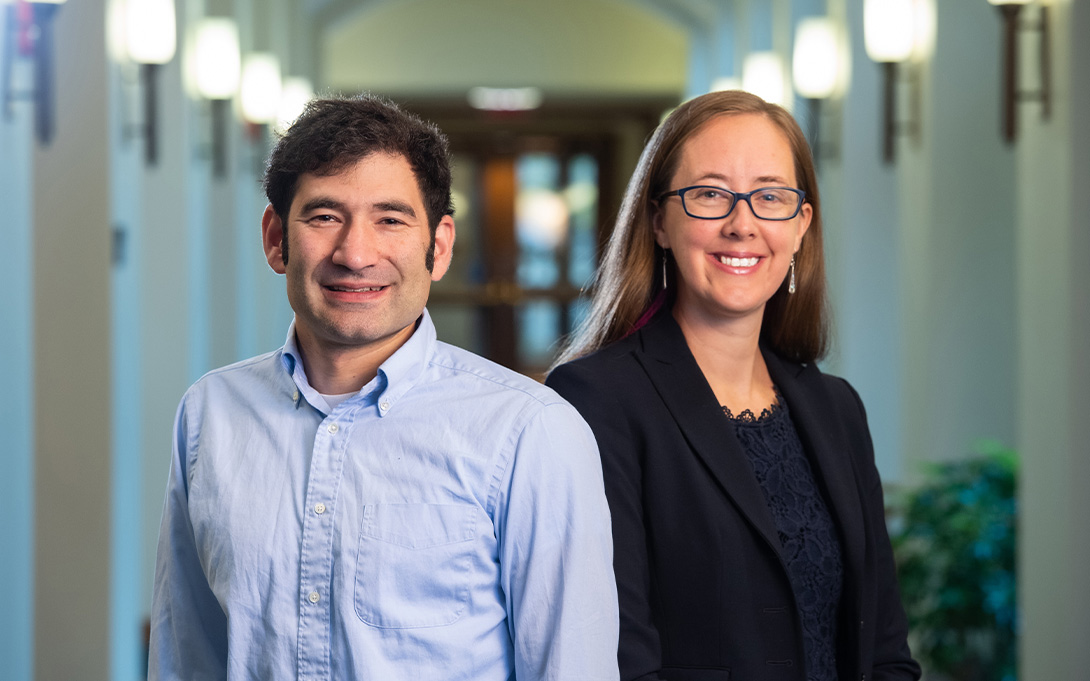
It’s a great week in the Hausman household, with news that both professor Catherine Hausman and professor Joshua Hausman will receive promotions to associate professors of public policy, with tenure, at the Ford School.
“Both Catie and Josh are top-notch scholars, with a strong track record of teaching, service, and engaging in policy-relevant work,” said Michael S. Barr, dean of the Ford School. “Catie uses interdisciplinary research to inform and participate in energy and environmental policy debate across the country. Josh takes on important historical and policy questions from many angles to make significant contributions to our understanding of monetary and fiscal policy in depressed economies.”
Catie Hausman focuses on environmental and energy economics. Recent projects have looked at the natural gas sector's role in methane leaks, the impact of climate change on the electricity grid, and the effects of nuclear power plant closures. She was appointed faculty research fellow of the Environment and Energy Economics (EEE) group at the National Bureau of Economic Research (NBER), the nation’s leading nonprofit economic research organization. Colleagues note that Catie “demonstrates excellence by making important and original contributions to our understanding of the natural gas industry and its effects on the American economy, the electricity industry, and climate change.”
Catie has presented her research on "Inequality, Information Failures, and Air Pollution" at several online conferences over the past two months to regulators and other policy stakeholders, and academics. She looks forward to her continued collaboration with U-M units in new areas of research on climate change and energy markets.
Josh Hausman’s research interests are on economic history and macroeconomics with a focus on the U.S. economy in the 1930s and the Japanese economy today. Since coming to the Ford School in 2013, he has published seven papers, most in top peer-reviewed journals. His colleagues recognize him as among “the best economic historians in his cohort” that “addresses important questions that have often been overlooked in the literature.”
This summer, Josh plans to think about how economic history might inform our understanding of the current economic crisis and the appropriate policy response. In the longer-term, he is collaborating on research to understand the factors that drove the relatively speedy adoption of the passenger car in the U.S. compared to other countries.
Both Catie and Josh note the incredible warmth and thoughtfulness of the Ford School community and look forward to many more years in Ann Arbor. Josh Hausman said, “While I currently miss seeing my Ford School colleagues in person, their response to current events has been a reminder of what an amazing community this is. I've drawn inspiration from seeing how my colleagues -- not least Dean Barr -- have responded to the current crisis both by extraordinary efforts to facilitate education and community at the Ford School and by broader efforts to promote helpful policy responses to the current public health and economic crisis.”
“We are so pleased for both Catie and Josh, and grateful they are now among our tenured faculty,” said Barr.
Catherine H. Hausman is an associate professor at the Ford School and a faculty research fellow at the National Bureau of Economic Research. Her work focuses on environmental and energy economics. Recent projects have looked at the natural gas sector's role in methane leaks, the impact of climate change on the electricity grid, and the effects of nuclear power plant closures. Prior to her graduate studies, Catherine studied in Peru under a Fulbright grant. She has taught statistics, a policy seminar on energy and climate, and a course on government regulation of industry and the environment. She holds a BA from the University of Minnesota and a PhD from the University of California, Berkeley.
Josh Hausman is an associate professor of public policy and economics at the Ford School and a faculty research fellow at the National Bureau of Economic Research. His research interests are in economic history and macroeconomics with a focus on the U.S. economy in the 1930s and the Japanese economy today. Josh holds a BA in economics from Swarthmore College and a PhD in economics from the University of California, Berkeley. From 2005—2007 he worked as a research assistant at the Federal Reserve Board, and in 2010 he worked as a staff economist at the Council of Economic Advisers. Josh won the 2013 Allan Nevins prize for the best dissertation in U.S. or Canadian economic history.